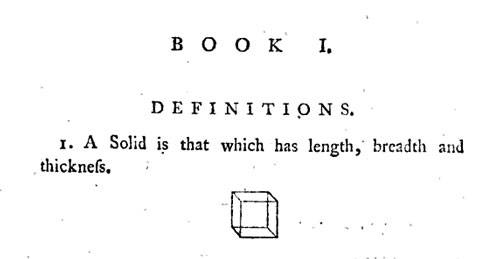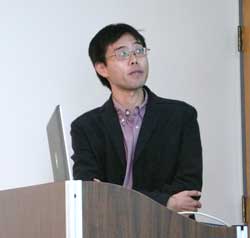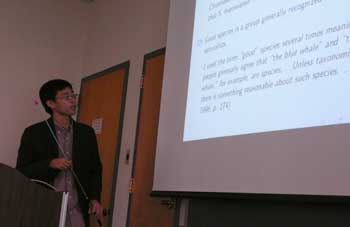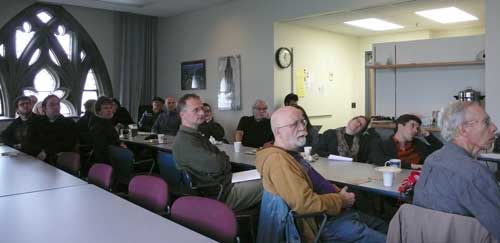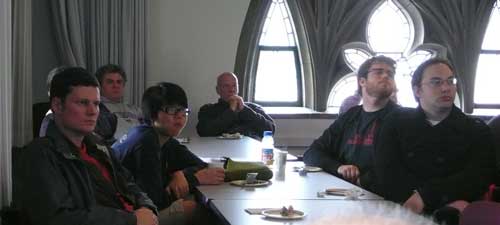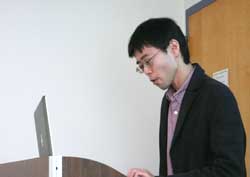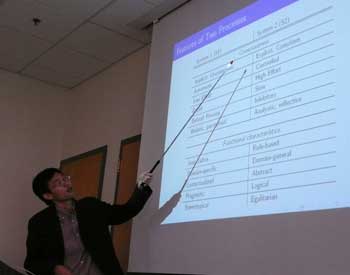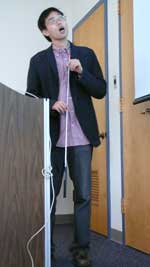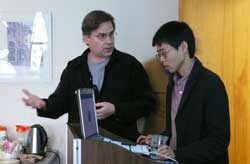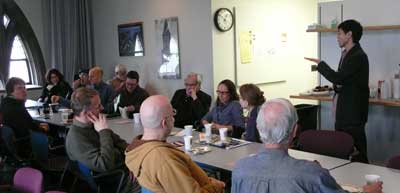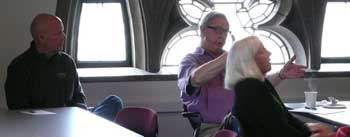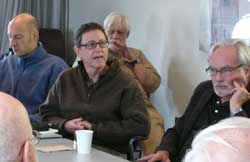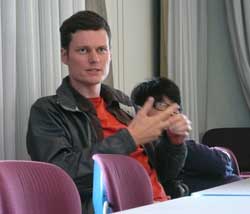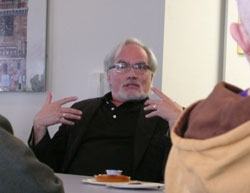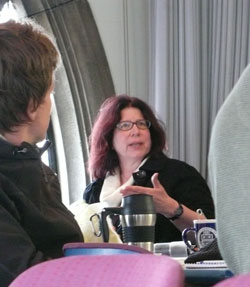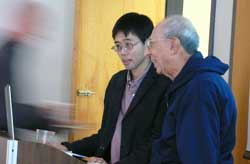

![]()
home
::: about
::: news
::: links
::: giving
::: contact
![]()
events
::: calendar
::: lunchtime
::: annual
lecture series
::: conferences
![]()
people
::: visiting fellows
::: postdoc fellows
::: resident fellows
::: associates
![]()
joining
::: visiting fellowships
::: postdoc fellowships
::: senior fellowships
::: resident fellowships
::: associateships
![]()
being here
::: visiting
::: the last donut
::: photo album
|
Define your terms! "Define your terms!" It is the simplest advice for a philosopher or a scientist about to engage in debate. It ranks along with the truisms novices bear before they face their first audiences. Don't talk too fast. Make eye contact. It has an ancient pedigree. The sublime achievement of ancient science, Euclid's Elements, taught us what a perfectly formulated science looks like. It starts with definitions. "A point is..." "A line is..." In my subspecialty of philosophy of physics, it is hard to imagine that this truism could cause trouble. We can define precisely which are the electrons and which the neutrinos. Until we do that we have little chance of speaking clearly about them. That things might not be so simple is suggested by the example of "probability." The difficulties of providing a precise definition of the term are widely known. I've long abandoned any interest in the project. Whatever benefits it had have been outweighed by the harm of mighty inquisitors demanding a precise, even operational definition for the term. The project collapses into the pursuit of a misplaced doctrinal purity.
I knew that getting clear on just what species are had proven vexing, the stuff of heated, late nights. As the talk unfolded, it was clear that the vexation remained.
All this was recapitulating what everyone in philosophy of biology knows, I presumed. It had the smell of decay. The idea of multiple definitions is a last ditched attempt to escape recalcitrant counterexamples. The danger of the escape is that you end up with a bag of definitions each of which, you soberly proclaim, work, except when they don't. There was clearly a problem here, not in biology, but in our analyses. Yuichi went on to sharpen the problem. The biologists reason about species without difficulty. They may not have a text-book worthy definition but they proceed as if the term has a single meaning. That tension--the failure of the definition project and successful use of the notion by biologists--set up the problem to be solved by the talk. Yuichi's solution seemed to me to go in just the right direction. Give up the quest for a Euclidean definition. Instead, Yuichi will draw on work in cognitive science. There the notion of a prototype has been introduced. It is a highly exemplary instance of a concept. Once we know the prototype we can identify others merely by their resemblance to it. Or at least that is what I expect is the driving idea. I don't now recall that Yuichi explicitly said this. The remainder of the talk was devoted to developing this approach. His first step was to propose the notion of a "good species." These are cases that could function as the prototype. They satisfy many or most of the criteria one might have for a species and are recognized by naturalists as species.
The talk proceeded in this way, shifting back and forth between species in biology and notions in psychology. I was following, but the details were getting ahead of me. Neither are my fields so it takes extra concentration to keep up. Instead, I was getting interested in an atavism of the talk. We routinely point at our slides with laser pointers. I had purchased a green laser, powerful enough to do eye surgery on the bored eyes in the back row, if I chose it.
It seemed to me that Yuichi's turn away from definitions to prototypes was the right move. What more could there be to say? What I'd forgotten was that this was an old debate. That means that everyone who has any acquaintance with the problem has a view. The exercise in listening to a talk is to see where the talk and your view differ, even if only in a crumb. That difference then becomes a banquet. Yuichi had, unwittingly, placed too much on the menu, for he had opened discussion not just of the species problem in biology but prototype theory and dual process theory in cognitive science. This was a room with opinions and they were opinions on all this. Yuichi was about to discover them. Peter Machamer opened with the first question."Under the prototype theory," he demanded, "why isn't a whale a fish?" My gaze dropped and my heart sank. This was a question asked more for rhetorical effect than to open useful discussion, for even I knew enough biology to see that the prototype approach could deal with that case. It might be difficult to sustain it in the quick repartee of question time with a quick witted questioner. The useful question would have asked about a real, but less theatrical, borderline case. Then Peter said something disparaging about dual process theory. I settled in to my job as referee. We are scheduled to discuss Yuichi's ideas on species tomorrow in our reading group. There will be much to discuss. I might suggest that not all questions need to be answered with the full weight of Japanese politeness. John D. Norton
|
